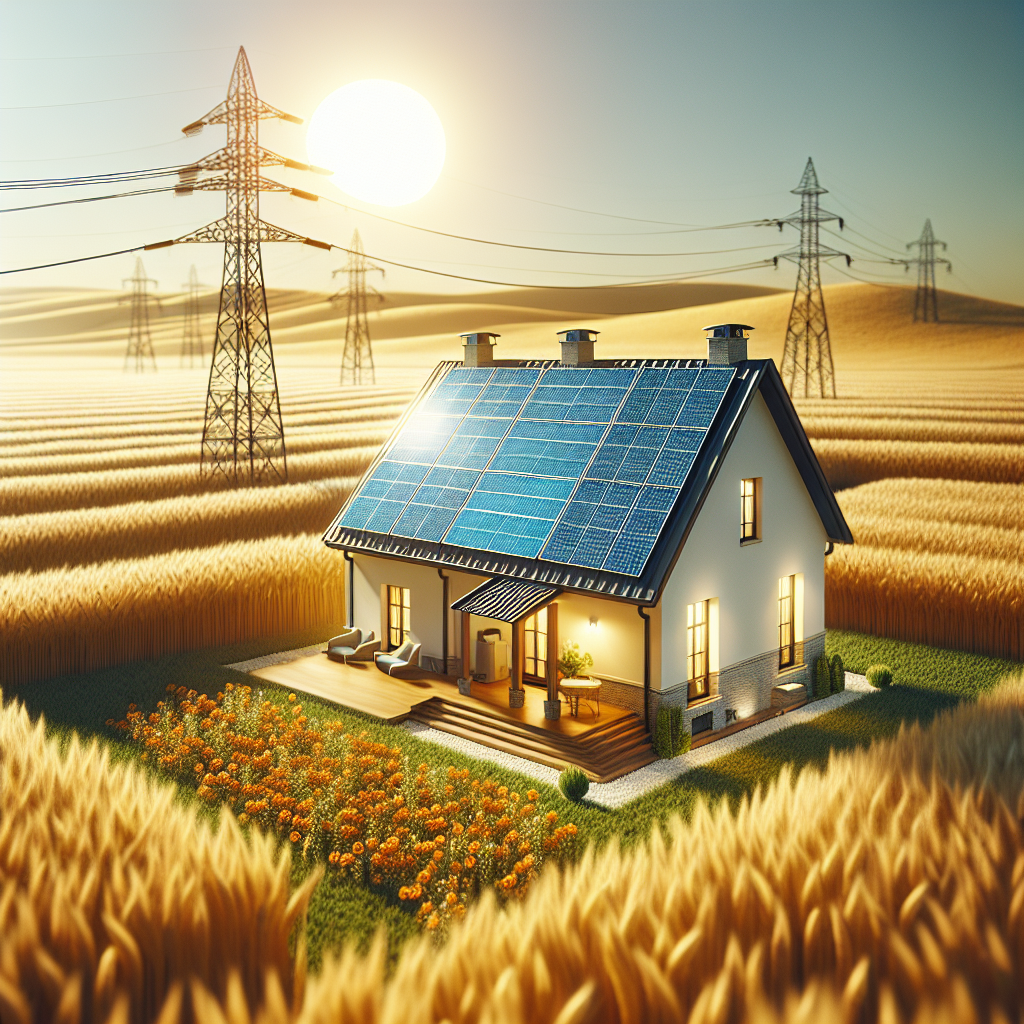Living a solar-powered life can be a rewarding and sustainable way to reduce your carbon footprint and save on energy costs. But many people wonder if it’s possible to stay connected to the grid while embracing solar energy. The good news is that yes, you can still tap into the grid even if you are generating your own electricity through solar power. This allows you to have a reliable backup during times of low sunlight or high energy demand, giving you peace of mind and flexibility in your energy usage. So, let’s explore how you can achieve the best of both worlds – benefiting from solar power while maintaining a grid connection.

Advantages of Connecting to the Grid
Reduced reliance on batteries
When living a solar-powered life, connecting to the grid can significantly reduce your reliance on batteries. While batteries are an important component of off-grid systems, they have their limitations. Batteries need to be charged by solar panels during the day in order to provide electricity at night or during cloudy periods. However, if your energy consumption exceeds the battery capacity, you may face a power shortage. By connecting to the grid, you can use grid electricity as a backup when your solar system cannot meet your energy demands, ensuring a consistent power supply without relying solely on batteries.
Ability to sell excess energy
Another advantage of connecting to the grid is the opportunity to sell excess energy generated by your solar system back to the utility company. This process, known as net metering, allows you to receive credits for the surplus electricity you contribute to the grid. By feeding this excess energy into the grid, you are essentially turning your meter backward, reducing your overall electricity costs and potentially even earning extra income. This ability to earn credits or monetary compensation for unused energy is a significant financial incentive for many solar-powered households.
Increased reliability
Connecting to the grid also offers increased reliability compared to relying solely on solar power. While solar panels are highly efficient in generating electricity, they are dependent on sunlight. Cloudy days or periods of low solar radiation can affect the output of solar systems. By accessing electricity from the grid, especially during these periods, you can ensure a constant source of power. The availability of a reliable grid connection provides peace of mind, particularly during unpredictable weather conditions or in situations where your solar system may be temporarily insufficient to meet your energy needs.
Disadvantages of Connecting to the Grid
Cost of installation
One of the primary disadvantages of connecting to the grid is the cost associated with the initial installation. The process entails connecting your solar system to the existing electrical grid infrastructure, which requires professional expertise and equipment. Installation costs can vary significantly depending on factors such as the size of your solar system, the complexity of the grid connection, and any necessary upgrades or modifications to your electrical panel. Although the upfront expense can be substantial, it is important to consider the long-term financial benefits and energy independence that grid connection can offer.
Monthly utility fees
Another drawback of connecting to the grid is the obligation to pay monthly utility fees. Even though you generate your own electricity through solar power, you will still be connected to the utility company’s grid infrastructure. This means you will need to maintain a contractual relationship with your utility provider and continue paying a portion of your electricity bills. The fees charged by utility companies can vary depending on your location and the specific terms of your agreement. It is essential to carefully evaluate these costs and compare them against the financial benefits derived from grid connection.
Dependence on the grid
Lastly, connecting to the grid means you are still dependent on the grid for your energy needs. If there is a widespread power outage or maintenance work being carried out on the grid, you may experience a disruption in your electricity supply. While solar systems with battery storage can provide a certain level of independence during these situations, they too can be limited by their capacity. It is important to weigh the reliability of grid power against the potential periods of disconnect and assess how essential uninterrupted power is for your lifestyle.
Net Metering
Definition and concept
Net metering is a billing arrangement that allows solar-powered households to receive credits or monetary compensation for excess electricity generated and fed back into the grid. It is a policy framework that encourages the adoption of renewable energy by providing incentives to homeowners who install solar systems. Instead of being wasted or lost, the surplus energy is effectively “banked” and credited to the homeowner’s account. This concept ensures a fair and equitable exchange between solar-powered households and utility companies.
How net metering works
Net metering operates through a bi-directional meter installed in homes with solar power systems. This special meter measures both the electricity consumed from the grid and the electricity generated by the solar panels. When the solar system generates more electricity than is being used, the excess energy is sent back to the grid and the meter runs in reverse, effectively subtracting the surplus from the homeowner’s consumption. This surplus is then converted into credits, which can be used to offset future electricity bills or even sold back to the utility company.
Pros and cons of net metering
Net metering offers several advantages for homeowners. It provides a financial incentive by reducing overall electricity costs through the credits earned for excess energy. Additionally, net metering promotes renewable energy adoption and reduces carbon footprints by supporting the grid with clean, sustainable power. However, it is important to note that net metering policies can vary by location and utility company. Some regions may have limitations on the size of solar systems eligible for net metering, and others may have interconnection fees or specific time-of-use rates. It is crucial to understand the specific rules and regulations associated with net metering in your area to fully maximize its benefits.
Grid-Tied Solar Systems
Definition and components
Grid-tied solar systems, also known as grid-connected or grid-interconnected systems, are solar power installations that are connected to the electrical grid. These systems operate in conjunction with the utility company’s power supply, allowing the seamless transfer of electricity between the solar panels and the grid. The main components of a grid-tied solar system include solar panels, an inverter, a bi-directional utility meter, and a system control unit.
Benefits of grid-tied solar systems
Grid-tied solar systems offer several benefits for homeowners. Firstly, these systems allow for the utilization of both solar power and grid electricity, ensuring a consistent power supply regardless of fluctuations in weather conditions or solar production. Secondly, excess energy generated by the solar panels can be fed back into the grid, earning credits or monetary compensation through net metering. This reduces electricity bills and may even result in additional income. Lastly, grid-tied solar systems require minimal maintenance compared to off-grid systems, as there is no need for battery upkeep or replacements.
Limitations of grid-tied solar systems
While grid-tied solar systems provide many advantages, they are not without limitations. One major limitation is their dependence on the grid for power supply. In the event of a grid outage, grid-tied systems will automatically shut down to prevent any energy from flowing back into the grid, potentially endangering utility workers. This means that during a power outage, grid-tied systems alone cannot provide electricity to the home, unless combined with battery storage or a backup generator. Additionally, grid-tied systems are subject to any changes in policies, regulations, or tariffs that may be imposed by the utility company, which could impact the financial benefits associated with net metering.
